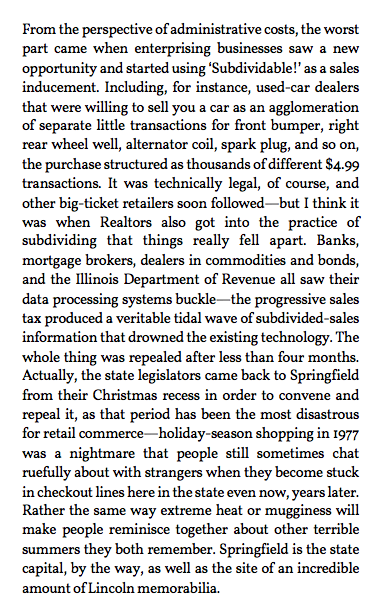From the Gospel According to David Foster Wallace by Adam S. Miller:
1. Boredom
13:
The real is boring and user-unfriendly. It resists attention, it’s “a fact-pattern the bulk of which was entropic and random” (PK 16). The real is full of noise, and more, it’s full of patterns that look like noise.
30:
So much of the real is dull and indifferent and expensive. The cost of the real feels too high and so we dream about something else, something easier, someplace else. We may sit down in our office chairs, but when we do, we’re like Hal, who though he’s managed to sit down, spends his time, “scrolling through an alphabetical list of places he’d rather be” (IJ 806).
…
We run from the dull like death itself. Why is it that “dullness proves to be such a powerful impediment to attention” (PK 85)? What’s so terrifying about an empty room or a silent car or a hard math problem? Why does boredom seem painful? Shouldn’t it just be boring?
Maybe dullness is associated with psychic pain because something that’s dull or opaque fails to provide enough stimulation to distract people from some other, deeper type of pain that is always there, if only in an ambient low-level way … I can’t think anyone really believes that’s today’s so-called “information society” is just about information. Everyone knows it’s about something else, way down (PK 85).
55:
[Lane Dean’s] new middle-class with government benefits seemed like a boon, but once there he starts to see what the job actually entails: a desk, a chair, a pencil, some memos, some forms, an unending stream of tax returns in need of examination, and a clock.
2. Concentration
65:
“The way deskwork goes is in jagged little fits and starts, brief intervals of concentration alternated with frequent trips to the men’s room, the drinking fountain, the vending machine, constant visits to the pencil sharpener, phone calls you suddenly feel are imperative to make, rapt intervals of seeing what kinds of shapes you can bend a paperclip into, & c. This is because sitting still and concentrating on just one task for an extended length of time, is, as a practical matter, impossible” (PK 291).
29:
When he concentrates, Shane Drinion levitates. Usually the distance between his butt and his seat is too small to be visible. But if his concentration deepends, he may float a few inches into the air. Drinion is good at concentrating, especially if the material is difficult, and this makes him very good at examining tax returns.
70:
Meredith Rand asks him, is “paying attention the same thing as being interested in somebody?” And Drinion responds: “Well, I would say almost anything you pay close, direct attention to becomes interesting” (PK 456).
15:
The boy has asthma and needs to stay inside. It’s raining on the day that, bored, the boy starts bending himself into new shapes and his life’s work accidentally begins. In the months and years that follow, the boy patiently works away at twisting his joints and loosening the body’s grip on itself. He works mainly in the bedroom and he keeps the door closed. The carpet is white shag. There’s a tree outside the window. Sometimes his father sits outside the boy’s door and listens, trying to tell what’s going on inside. The father is worried and doesn’t know what to do. The boy’s mother is gone. The boy, though, takes his work seriously.
3. The Other Side of Boredom
70:
“To retain care and scrupulosity about each detail from within the teeming wormball of data and rule and exception and contigency which constitutes real-world accounting – this is heroism” (PK 231). That kind of connection depends on learning how to pay attention to life’s insignificant details. It depends on learning how to care for their errancy and opacity. It depends on bringing yourself to bear on what presents as boring, again and again, until you finally discover “that boring activities become, perversely, much less boring if you concentrate intently on them” (IJ 203).
77:
Boredom is a head-clearing ascesis. The key to clearing your head is “to find the other side of the rote, the picayune, the meaningless, the repetitive, the pointlessly complex. To be, in a word, unborable” (PK 438).
99:
…at this point, it doesn’t really matter what your head thinks. It just matters what your body does. Gately’s rehab sponsors advise him to start praying, but they couldn’t care less if he believes in God. It’s irrelevant. Speaking at an AA meeting, Gately says he
“feels about the ritualistic Please and Thank You prayers rather like a hitter that’s on a hitting streak and doesn’t change his jock or socks or pre-game routine for as long as he’s on the streak. … He says but when he tried to go beyond the very basic rote automatic get-me-through-this-day-please stuff, when he kneels at other times and prays or mediates or tries to achieve a Big-Picture spirtitual understanding of a God as he can understand Him, he feels Nothing – not nothing but Nothing, an edgeless blankness that somehow feels worse than the sort of unconsidered atheism he Came In with” (IJ 443).
101:
Prayer ends up being more like baking a cake than like having a meaningful conversation with your long lost father. Cake boxes come with a cake mix already inside, premixed, and “with directions on the side any eight-year old could read” (IJ 467). There’s no need to reinvent the wheel and make the whole thing all metaphysical.

Leave a Reply